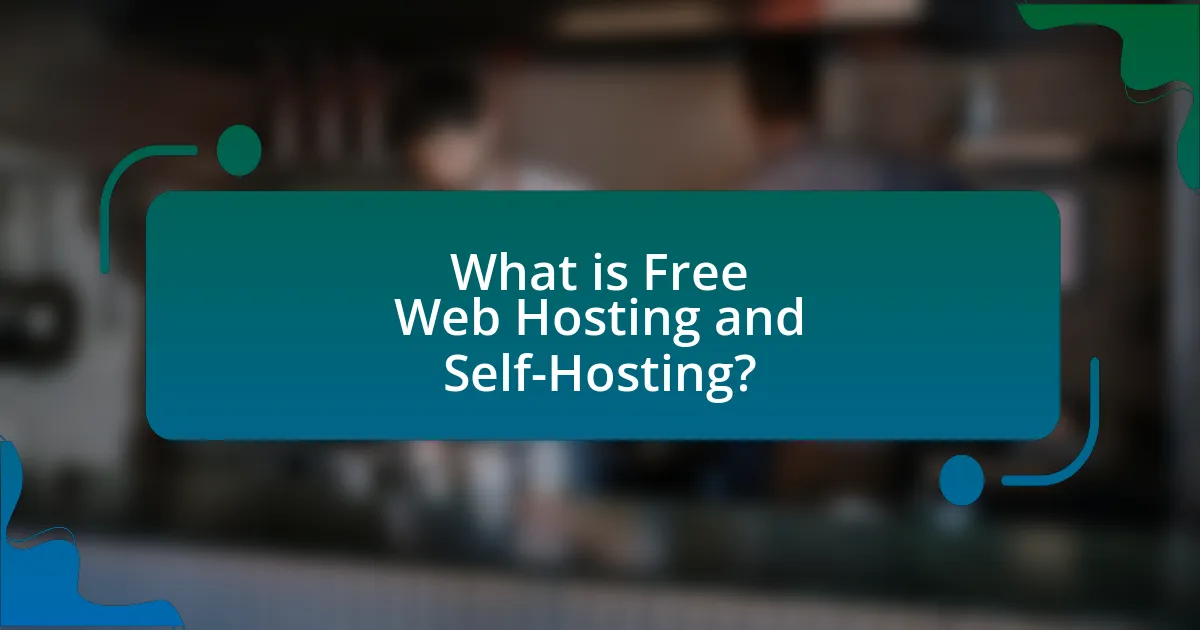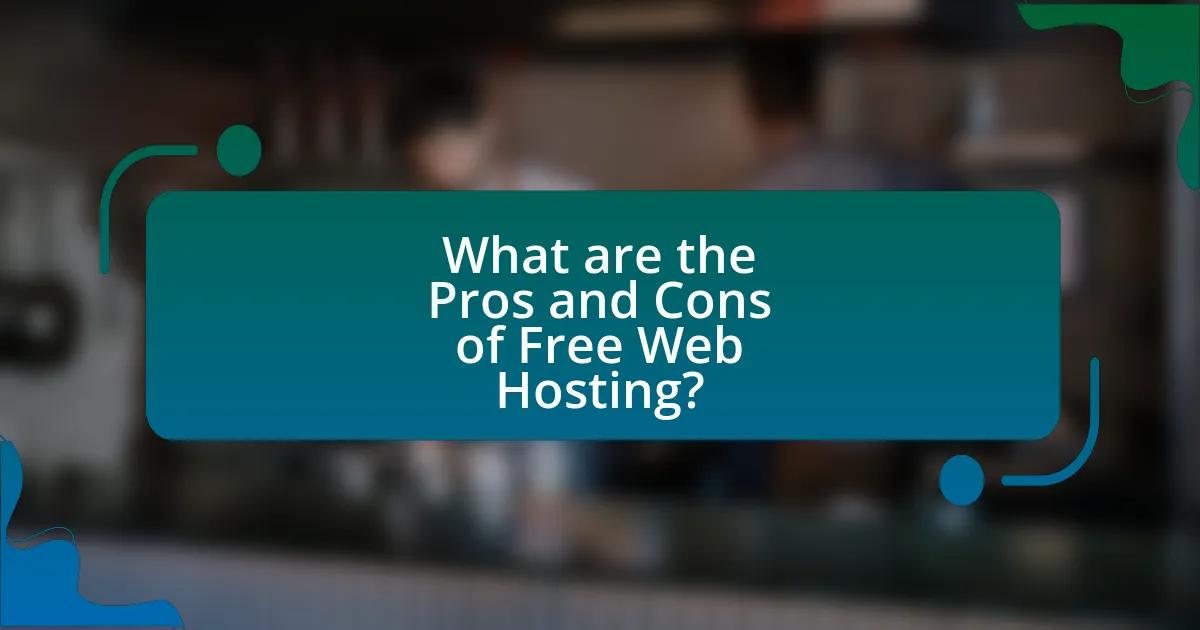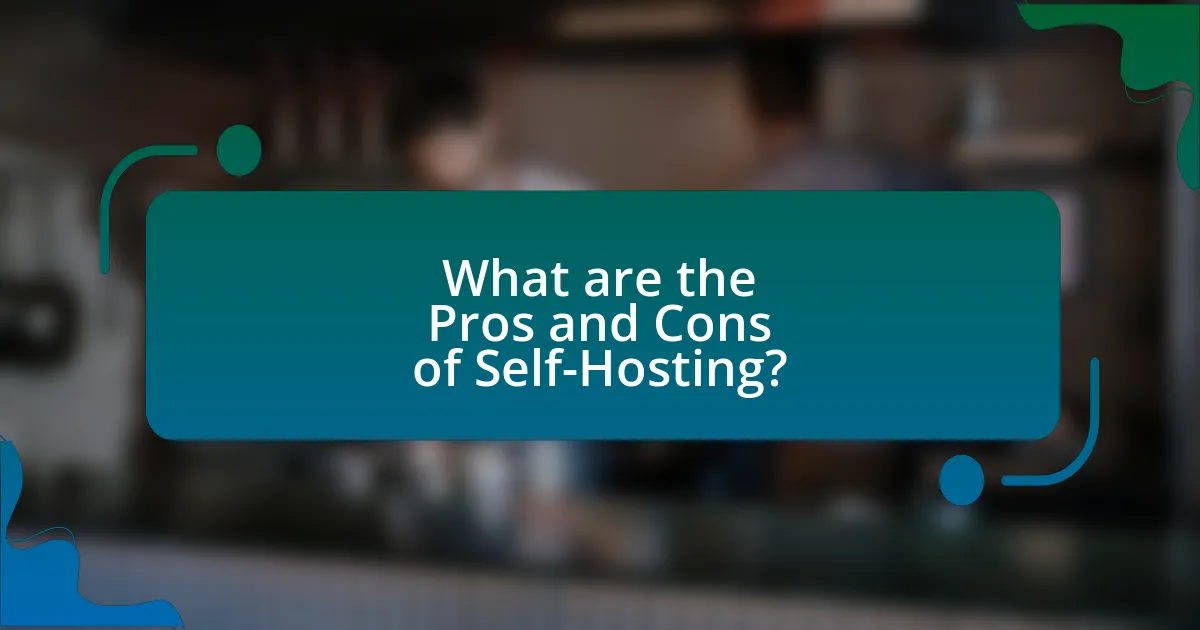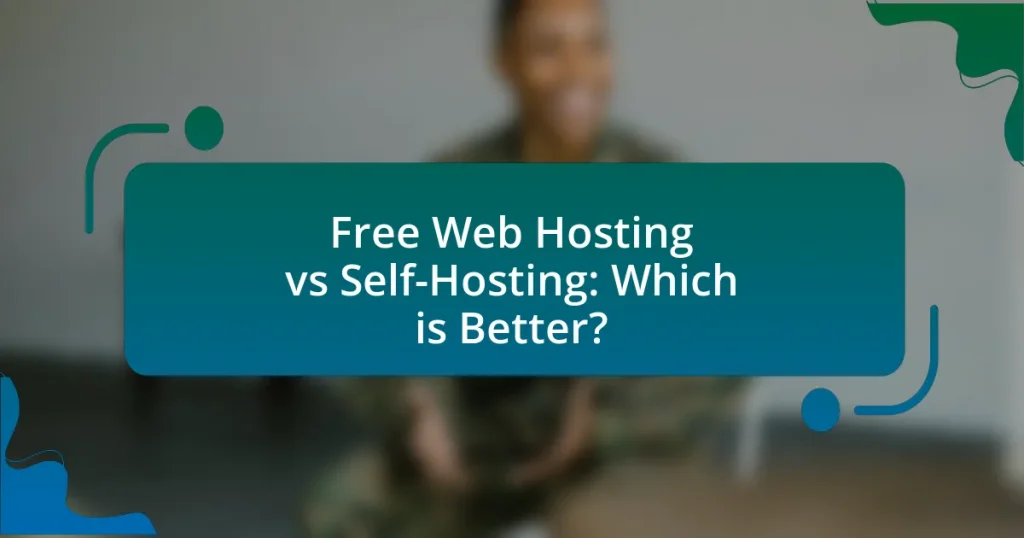The article examines the differences between free web hosting and self-hosting, highlighting their respective features, advantages, and disadvantages. Free web hosting offers a cost-effective solution for individuals and small businesses but comes with limitations such as restricted resources, lack of customer support, and potential security vulnerabilities. In contrast, self-hosting provides complete control over the server environment, enhanced customization, and improved security, though it requires technical expertise and initial investment. The article also discusses common use cases for both options, performance comparisons, and best practices for selecting the appropriate web hosting solution based on specific needs.

What is Free Web Hosting and Self-Hosting?
Free web hosting is a service that allows individuals or organizations to host their websites on the internet without any cost, typically supported by advertisements or limited features. In contrast, self-hosting refers to the practice of hosting a website on one’s own server or computer, providing complete control over the hosting environment and resources. Free web hosting often comes with restrictions such as bandwidth limits and lack of customer support, while self-hosting requires technical knowledge and investment in hardware but offers greater flexibility and customization options.
How do Free Web Hosting and Self-Hosting differ?
Free web hosting and self-hosting differ primarily in control and resources. Free web hosting provides limited server space and bandwidth, often with restrictions on customization and advertising, while self-hosting allows users to manage their own servers, offering full control over configurations, software, and resources. For instance, free hosting services like WordPress.com impose limitations on features and may display ads, whereas self-hosting with platforms like DigitalOcean enables users to install any software and scale resources as needed. This fundamental difference impacts user experience, flexibility, and potential costs associated with each option.
What are the key features of Free Web Hosting?
Free web hosting typically includes features such as limited storage space, bandwidth restrictions, and the presence of advertisements on hosted sites. These services often provide basic website builders and support for common programming languages, but may lack advanced functionalities like custom domain names or email hosting. According to a survey by HostingAdvice, 70% of free hosting users reported dissatisfaction due to these limitations, highlighting the trade-offs involved in opting for free services.
What are the key features of Self-Hosting?
Self-hosting allows individuals or organizations to manage their own web servers and applications, providing key features such as complete control over data, customization options, and enhanced security. Complete control over data means users can decide how their information is stored and managed, reducing reliance on third-party services. Customization options enable users to tailor their server configurations and software to meet specific needs, unlike standardized solutions offered by free hosting services. Enhanced security is achieved through the ability to implement personal security measures, such as firewalls and encryption, which are often limited in free hosting environments. These features collectively make self-hosting a compelling choice for those seeking greater autonomy and flexibility in their web presence.
What are the common use cases for Free Web Hosting?
Common use cases for free web hosting include personal websites, small business sites, educational projects, and hobbyist blogs. Personal websites often utilize free hosting to establish an online presence without financial commitment. Small businesses may use free hosting for basic informational sites to test their market presence. Educational projects frequently leverage free hosting for student portfolios or class assignments, allowing easy access to work without costs. Hobbyist blogs benefit from free hosting by providing a platform for sharing interests and engaging with communities without incurring expenses. These use cases demonstrate the versatility and accessibility of free web hosting for various users.
Who typically uses Free Web Hosting services?
Individuals and small businesses typically use Free Web Hosting services. These users often seek cost-effective solutions for personal projects, hobby websites, or startups with limited budgets. According to a survey by HostingAdvice, around 30% of small business owners reported using free hosting options to minimize expenses while establishing an online presence.
What types of websites are best suited for Free Web Hosting?
Free web hosting is best suited for personal blogs, small portfolios, and hobby websites. These types of websites typically have lower resource demands and do not require extensive features or high traffic handling capabilities. Personal blogs often focus on content sharing rather than monetization, making free hosting a viable option. Small portfolios showcase individual work and do not usually attract large audiences, while hobby websites cater to niche interests that may not generate significant traffic. Therefore, the limited resources and features of free web hosting align well with the needs of these website types.

What are the Pros and Cons of Free Web Hosting?
Free web hosting offers several advantages and disadvantages. The primary pros include zero cost, making it accessible for individuals and small businesses with limited budgets, and ease of use, as many free hosting services provide user-friendly interfaces and templates. However, the cons are significant; these include limited storage and bandwidth, which can hinder website performance, lack of customer support, and the presence of ads on hosted sites, which can detract from professionalism. Additionally, free web hosting often lacks essential features such as custom domain names and security measures, making it less suitable for serious projects.
What advantages does Free Web Hosting offer?
Free web hosting offers several advantages, primarily cost savings and accessibility. Users can create and maintain websites without incurring expenses, making it an attractive option for individuals and small businesses with limited budgets. Additionally, free web hosting services often provide user-friendly interfaces and templates, enabling users with minimal technical skills to set up their sites easily. According to a survey by HostingAdvice, 70% of users choose free hosting for its affordability, highlighting its appeal for those starting online projects or testing ideas without financial commitment.
How does cost-effectiveness play a role in Free Web Hosting?
Cost-effectiveness is a primary factor in free web hosting, as it allows users to establish an online presence without incurring financial costs. Free web hosting services typically generate revenue through advertisements or limited features, making them accessible to individuals and small businesses with budget constraints. According to a 2021 survey by HostingAdvice, 70% of small business owners reported that cost was a significant factor in their choice of web hosting, highlighting the importance of affordability in decision-making. Thus, the cost-effectiveness of free web hosting attracts users who prioritize minimal expenses while still seeking basic online functionality.
What are the limitations of Free Web Hosting?
Free web hosting has several limitations, including restricted storage space, limited bandwidth, and lack of customer support. These constraints can hinder website performance and scalability, as many free hosting services impose strict quotas that can lead to slow loading times or downtime during high traffic periods. Additionally, free web hosting often includes mandatory advertisements, which can detract from the user experience and brand image. Security features are typically minimal, increasing vulnerability to cyber threats. Furthermore, users may face restrictions on custom domain names and access to advanced features, limiting their ability to fully customize their websites.
What are the potential risks associated with Free Web Hosting?
Free web hosting poses several potential risks, including limited resources, security vulnerabilities, and lack of customer support. Limited resources can lead to slow website performance and downtime, as free hosting services often impose restrictions on bandwidth and storage. Security vulnerabilities arise because free hosting providers may not implement robust security measures, making websites susceptible to hacking and data breaches. Additionally, the absence of reliable customer support can hinder timely resolution of technical issues, further jeopardizing website functionality and user experience.
How does data security compare in Free Web Hosting?
Data security in free web hosting is generally lower compared to paid hosting options. Free web hosting services often lack robust security measures such as SSL certificates, regular backups, and advanced firewalls, making them more vulnerable to data breaches and cyberattacks. For instance, a study by the Cybersecurity & Infrastructure Security Agency (CISA) indicates that free hosting platforms are frequently targeted due to their limited security protocols. Additionally, many free hosting providers monetize their services through ads, which can lead to potential data privacy issues.
What are the implications of limited customer support in Free Web Hosting?
Limited customer support in free web hosting can lead to significant operational challenges for users. When issues arise, such as website downtime or technical difficulties, the lack of timely assistance can result in prolonged outages, negatively impacting user experience and potentially leading to loss of traffic and revenue. According to a survey by HostingAdvice, 70% of users reported that inadequate support was a primary reason for switching hosting providers. This highlights the critical role that responsive customer service plays in maintaining website functionality and user satisfaction.

What are the Pros and Cons of Self-Hosting?
Self-hosting offers several advantages and disadvantages. The primary pros include complete control over the server environment, which allows for customization and optimization according to specific needs, and potentially lower long-term costs compared to paid hosting services. Additionally, self-hosting enhances data privacy and security, as users manage their own data without relying on third-party providers.
Conversely, the cons of self-hosting involve the requirement for technical expertise to set up and maintain the server, which can be a barrier for non-technical users. There are also higher initial costs for hardware and software, along with ongoing expenses for maintenance and potential downtime. Furthermore, self-hosting can expose users to security risks if not properly managed, as they are responsible for implementing security measures.
What benefits does Self-Hosting provide?
Self-hosting provides enhanced control over data and customization options. Users can manage their own servers, ensuring data privacy and security, which is crucial for businesses handling sensitive information. Additionally, self-hosting allows for tailored configurations and software installations that meet specific needs, unlike free hosting services that often impose limitations. According to a 2021 survey by HostingAdvice, 70% of businesses reported improved performance and reliability when opting for self-hosted solutions compared to free alternatives.
How does control over resources enhance Self-Hosting?
Control over resources enhances self-hosting by providing users with the ability to customize their server environment, optimize performance, and ensure data security. When individuals or organizations manage their own servers, they can allocate resources such as CPU, memory, and storage according to their specific needs, leading to improved efficiency and responsiveness. Additionally, self-hosting allows for the implementation of tailored security measures, reducing vulnerabilities associated with shared hosting environments. This control is supported by the fact that self-hosted solutions can utilize dedicated hardware or virtual private servers, which offer greater reliability and uptime compared to free hosting options that often come with limitations and shared resources.
What are the scalability options with Self-Hosting?
Self-hosting offers several scalability options, including vertical scaling, horizontal scaling, and cloud integration. Vertical scaling involves upgrading existing hardware resources, such as increasing CPU, RAM, or storage, to handle more traffic or data. Horizontal scaling entails adding more servers to distribute the load, which enhances performance and reliability. Cloud integration allows self-hosted solutions to leverage cloud services for additional resources on demand, facilitating seamless scaling without significant upfront investment. These options enable users to adapt their infrastructure according to growing demands, ensuring efficient resource management and improved performance.
What challenges come with Self-Hosting?
Self-hosting presents several challenges, including technical complexity, security risks, and ongoing maintenance requirements. Users must possess a certain level of technical expertise to set up and manage servers, which can be daunting for those without IT backgrounds. Security is a significant concern, as self-hosted solutions are often more vulnerable to cyberattacks if not properly configured and maintained. Additionally, self-hosting requires continuous updates and monitoring to ensure optimal performance and security, which can be time-consuming and resource-intensive. According to a survey by Stack Overflow, 50% of developers reported that managing infrastructure is one of the most challenging aspects of their work, highlighting the difficulties associated with self-hosting.
How does the initial setup complexity affect Self-Hosting?
Initial setup complexity significantly impacts self-hosting by determining the ease or difficulty of deploying and managing a server environment. A more complex setup often requires advanced technical skills, which can deter users with limited experience, leading to potential misconfigurations and security vulnerabilities. For instance, a survey by Stack Overflow in 2021 indicated that 50% of developers found server setup to be a challenging aspect of self-hosting, highlighting the importance of user-friendly installation processes. Thus, the complexity of initial setup directly influences user adoption and the overall success of self-hosting solutions.
What ongoing maintenance is required for Self-Hosting?
Ongoing maintenance for self-hosting includes regular software updates, security monitoring, data backups, and server performance optimization. Software updates are crucial to ensure that the operating system, web server, and applications are running the latest versions, which helps protect against vulnerabilities. Security monitoring involves checking for unauthorized access and potential threats, while data backups are essential to prevent data loss in case of hardware failure or cyberattacks. Additionally, server performance optimization ensures that the hosting environment runs efficiently, which can involve managing resources and scaling as needed. These maintenance tasks are necessary to keep a self-hosted environment secure and functional.
How do Free Web Hosting and Self-Hosting compare in terms of performance?
Free web hosting generally offers lower performance compared to self-hosting due to limited resources and shared server environments. In free hosting, multiple users share the same server, which can lead to slower load times and reduced reliability, especially during peak traffic periods. In contrast, self-hosting allows for dedicated resources, enabling faster response times and better overall performance, as users can optimize their server settings and hardware according to their specific needs. Studies indicate that websites on self-hosted servers can achieve load times under two seconds, while free hosting services often exceed three seconds, highlighting the significant performance gap between the two options.
What factors should be considered when choosing between Free Web Hosting and Self-Hosting?
When choosing between Free Web Hosting and Self-Hosting, key factors include control, cost, performance, and support. Control is limited with free hosting, as providers often impose restrictions on features and customization, while self-hosting offers full control over server settings and software. Cost is a significant factor; free hosting incurs no financial expense but may lead to hidden costs in terms of ads or limited resources, whereas self-hosting requires upfront investment in hardware and ongoing maintenance costs. Performance can vary greatly; free hosting may suffer from slower speeds and downtime due to shared resources, while self-hosting can provide optimized performance tailored to specific needs. Lastly, support is typically minimal with free hosting, leaving users to troubleshoot issues independently, whereas self-hosting allows for personalized support options, depending on the chosen service provider.
What are the best practices for selecting a web hosting option?
The best practices for selecting a web hosting option include evaluating performance, reliability, customer support, scalability, and cost. Performance is crucial; a hosting service should provide fast loading times and high uptime percentages, ideally above 99.9%. Reliability is essential, as consistent service availability impacts user experience and SEO rankings. Customer support should be accessible 24/7 through multiple channels, ensuring prompt assistance during issues. Scalability allows for future growth, enabling users to upgrade resources as needed without significant downtime. Cost should be balanced with features; the cheapest option may lack essential services, while more expensive plans should justify their pricing with added value. These practices ensure that the chosen web hosting option meets both current and future needs effectively.
How can users assess their specific needs for web hosting?
Users can assess their specific needs for web hosting by evaluating their website’s purpose, expected traffic, technical requirements, and budget. Identifying the website’s purpose helps determine whether shared, VPS, or dedicated hosting is necessary. Analyzing expected traffic informs the bandwidth and storage requirements, while understanding technical needs, such as programming languages or databases, guides the choice of hosting features. Finally, establishing a budget ensures that users select a hosting plan that aligns with their financial constraints.
What resources are available to help users make an informed decision?
Users can access various resources to make informed decisions about free web hosting versus self-hosting. These resources include comparison articles that outline the pros and cons of each option, user reviews that provide firsthand experiences, and forums where users can ask questions and share insights. Additionally, websites like HostingAdvice and TechRadar offer expert reviews and guides that analyze features, pricing, and performance metrics of different hosting services. Research studies, such as those published by the International Journal of Information Management, also provide data on user satisfaction and service reliability, further aiding decision-making.


